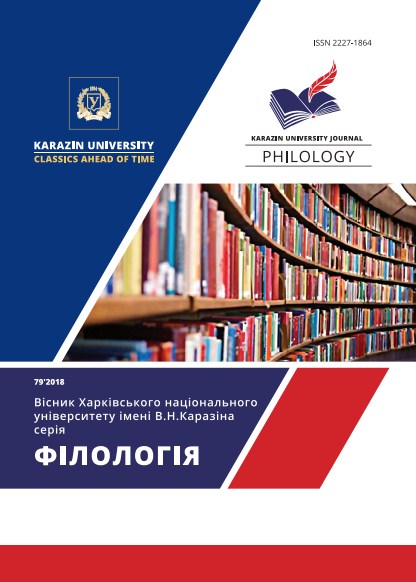Theatrum as lexical dominant of the sub-concept “THEATRE BUILDING” in Latin
Abstract
The present article deals with semantics and functioning of the lexeme ‘theatrum’ as the dominant of the sub-concept “Theatre building” in Latin language. The above mentioned lexeme has the wide range of meanings: a place for viewing dramatic performances; a place for public meetings; the audience; a field in which one’s qualities are exhibited publicitly. Its semantic nucleus forms “a place in which performances are given”. The performed analysis allows to make a conclusion about using lexeme ‘theatrum’ mostly in the direct sense, as place, where different spectacles had taken place (performances, people’s meeting, etc.) and also due to metonymical transferring to mark publics. It testifies about gradual narrowing and specialization of meaning, which happened in the following way: ”place, where something happens > place of performances > publics”. There are adjectives and participles, which characterize shape, size, decoration, attendance, which are used with the above mentioned lexeme. Derivative potential of lexeme ‘theatrum’ is narrow and presented with adjectives ‘theatralis’ and theatricus as well as with borrowed from Greek noun ‘theatridion’. A variety of theater was odeum "odeon", where musical and poetry competitions took place. Like much of the Latin theatrical vocabulary, this name is borrowed from the Greek ᾠδεῖον.
The analysis of the subconcept "Theatrical structure" in full, taking into account its two main parts - the scene and auditorium - realized within the framework of the corresponding conceptual fields, will form the prospect of research.
Downloads
References
Література
Зверев А. И. Театральная лексика и терминология в политическом дискурсе (на материале русской и немецкой публицистики). Дисс. канд. филол. наук/ 10.02.19 «Теория языка».– М., 2015. – 260 с.
Илова Е. В. Лингвокультурный концепт «Театр» в коллективном и индивидуально-авторском сознании: автореф. дисс. канд. филол. наук/ 10.02.19 «Теория языка». – Волгоград, 2008. –24 с.
Исаева Л. А., Калинина С. А. Лексико-фразеологическая репрезентация концептуализированного понятия театр в русской национальной картине мира // Культурная жизнь Юга России. –2015. – № 2 (57). – С. 78 – 82
Паві П. Словник театру. – Львів: ВЦ ЛНУ імені Івана Франка, 2006. – 640 с.
Словник української мови: в 11 томах. [Електронний ресурс]. Режим доступу: http://sum.in.ua
Forcellini Ae. Totius Latinitatis lexicon.– T. IV. – Patavi: Forni, 1965. – 1032 p.
Glare P. G. W. Oxford Latin dictionary. – Oxford: Clarendon Press, 1965. – XXIII, 2126 p.
González Vázquez C. Diccionario del teatro latino: léxico, dramaturgia, escenografía. – Madrid : Ediciones Clásicas, 2004. – XXI, 334 p.
González Vázquez C. M. El lexico teatral latino. Estudio terminologico y dramatico. – Madrid: Universidad autonoma de Madrid, 1996. – 914 p.
González Vázquez C. Towards an internal cohesion of the technical lexicon. Structures in Latin theatrical lexicon // Indogermanische Forschungen.–2011.–Bd.116. –S. 300-323
Kowzan T. Littérature et Spectacle. – La Haye: Mouton, 1975. – 240 p.
Lara Ortega S. El teatro romano de Sagunto: génesis y
construcción. – Valencia: Universidad politécnica de Valencia., 1991. – 326 p.
Liddell H. G. A Greek-English lexicon: with a revised supplement / comp. by H. G. Liddell, R. Scott, rev. and augm. throughout H. S. Jones. – Oxford: Clarendon Press, 1996. XIV, 2042, 320 p.
Polacco L. Théátre, société, organisation de l’état // Théátre et spectacles dans l’antiquité. – Strasbourg: Universite des sciences humaines de Strasbourg, 1983. – P. 5 – 14.
References
Zverev, A. I. (2015) Teatralnaya leksika i terminologiya v politicheskom diskurse (na materiale russkoy i nemetskoy publitsistiki) [Theatrical vocabulary and terminology in political discourse (on the basis of Russian and German journalism)]. Moscow. [in Russian]
Ilova, E. V. (2008) Lingvokulturnyiy kontsept «Teatr» v kollektivnom i individualno-avtorskom soznanii [Linguocultural concept «Theater» in the collective and individual-author's consciousness]. Volgograd. [in Russian]
Isaeva, L. A., Kalinina, S. A. (2015) Leksiko-frazeologicheskaya reprezentatsiya kontseptualizirovannogo ponyatiya teatr v russkoy natsionalnoy kartine mira [Lexico-phraseological representation of the conceptualized theater concept in the Russian national picture of the world] (PhD Thesis). Kulturnaya zhizn Yuga Rossii : no 2 (57), pp. 78 – 82. [in Russian]
Pavi, P. (2006) Slovnyk teatru [The Dictionary of the theater]. Lviv : VTs LNU imeni Ivana Franka. [in Ukranian]
Slovnyk ukrainskoi movy: v 11 tomakh [Dictionary of the Ukrainian language: in 11 volumes]. Available at: http://sum.in.ua [in Ukranian]
Forcellini, Ae. (1965) Totius Latinitatis lexicon. T. IV. Patavi: Forni.
Glare, P. G. W. (1965) Oxford Latin dictionary. Oxford: Clarendon Press.
González, Vázquez C. (2004) Diccionario del teatro latino: léxico, dramaturgia, escenografía. Madrid : Ediciones Clásicas.
González, Vázquez C. (1996) El lexico teatral latino. Estudio terminologico y dramatico. Madrid: Universidad autonoma de Madrid.
González, Vázquez C. (2011) Towards an internal cohesion of the technical lexicon. Structures in Latin theatrical lexicon. Indogermanische Forschungen. Bd.116, pp. 300–323.
Kowzan, T. (1975) Littérature et Spectacle. La Haye: Mouton.
Lara Ortega, S. (1991) El teatro romano de Sagunto: génesis y construcción. Valencia: Universidad politécnica de Valencia.
Liddell, H. G. A (1996) Greek-English lexicon: with a revised supplement / comp. by H. G. Liddell, R. Scott, rev. and augm. throughout H. S. Jones. Oxford: Clarendon Press.
Polacco, L. (1983) Théátre, société, organisation de l’état. Théátre et spectacles dans l’antiquité. Strasbourg: Universite des sciences humaines de Strasbourg, pp. 5–14.




